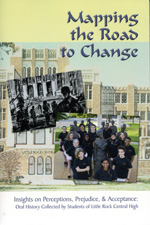by Judith Hayn
Little Rock Central High Memory Project (2012). Mapping the Road to Change: Insights on Perceptions, Prejudice, & Acceptance. Oral History Collected by Students of Little Rock Central High. www.lrchmemory.org
 Since February as Black History Month, I'm reviewing the text Mapping the Road to Change, a collection of oral histories written by ninth grade Civics students at Central High School in Little Rock, AR, site of one of the more infamous struggles of the Civil Rights Era. Senior editors reviewed over 300 essays and selected those they wanted to share with readers. They organized the essays into chapters, chose appropriate artwork, and wrote chapter commentaries under the guidance of three social studies teachers. Teachers also created a list of lesson ideas for civics classes, English classes, and to align with the Common Core State Standards. Mapping the Road is the second volume created through the Memory Project (Beyond Central High, Toward Acceptance, 2010).
Since February as Black History Month, I'm reviewing the text Mapping the Road to Change, a collection of oral histories written by ninth grade Civics students at Central High School in Little Rock, AR, site of one of the more infamous struggles of the Civil Rights Era. Senior editors reviewed over 300 essays and selected those they wanted to share with readers. They organized the essays into chapters, chose appropriate artwork, and wrote chapter commentaries under the guidance of three social studies teachers. Teachers also created a list of lesson ideas for civics classes, English classes, and to align with the Common Core State Standards. Mapping the Road is the second volume created through the Memory Project (Beyond Central High, Toward Acceptance, 2010).
Once started, the collection is difficult to put down. The selection process was thorough and would have created uncomfortable discussions as choices were made dealing with all aspects of bigotry as it has emerged beyond the racism of 1957. Issues of ethnicity, religion, socioeconomic status, and physical disabilities are explored by these teen researchers. Chelsi Page interviewed Linda Crawford who helped integrate the high school in Wichita Falls, TX, in the 1960s when she was 16. Abbas Naqvi talked with his Pakistani dad who came to Syracuse University in 1996 to get a master’s degree and reminisced about the changes that occurred in attitudes toward Muslims after 9/11. Rachel Schaffhauser met with Richard Yada from Rohwer, AR, and discusses his birth and early life in a Japanese internment camp in the 1940s. Cameron Matson interviewed his grandfather Jerome Liebman on Sanibel Island about his life growing up Jewish in Cleveland, OH. Gloria Atkins related to Ebony Stevenson about her youth as a biracial child in Little Rock during the 50s and 60s.
These stories are moving and poignant, and the conclusions by the young journalists are heart-felt; thus, teens will be drawn into the lives of others who have weathered prejudice and turned it into acceptance. The teachers and students involved in the project provide a blueprint for creating a similar undertaking. Interested educators can purchase the book and ask for assistance at the Memory Project website.
Dr. Judith A. Hayn is an associate professor at the University of Arkansas at Little Rock.
This article is part of a series from the Special Interest Group Network on Adolescent Literature (SIGNAL).